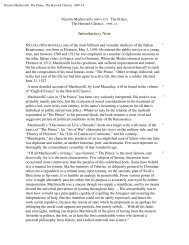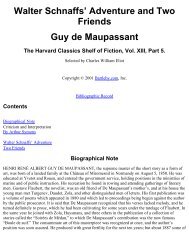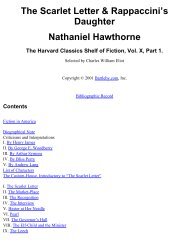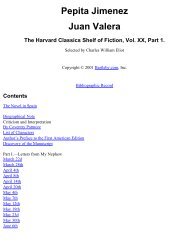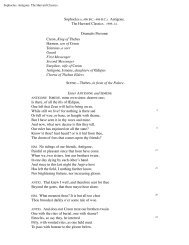Notre Dame de Paris - Bartleby.com
Notre Dame de Paris - Bartleby.com
Notre Dame de Paris - Bartleby.com
Create successful ePaper yourself
Turn your PDF publications into a flip-book with our unique Google optimized e-Paper software.
thirteenth. But architecture will never again be the social, the collective, the dominant art. The great epic,<br />
the great monument, the great master-piece of mankind will never again be built; it will be printed.<br />
And even if, by some fortuitous acci<strong>de</strong>nt, architecture should revive, she will never again be mistress.<br />
She will have to submit to those laws which she once imposed upon literature. The respective positions<br />
of the two arts will be reversed. Certainly, un<strong>de</strong>r the reign of architecture, the poems—rare, it is<br />
true—resemble the monuments of the time. The Indian Vyasa is strange, variegated, unfathomable, like<br />
the native pagoda. In Egypt the poetry shares the grand and tranquil lines of the edifices; in ancient<br />
Greece it has their beauty, serenity, and calm; in Christian Europe, the majesty of the Church, the<br />
simplicity of the people, the rich and luxuriant vegetation of a period of rebirth. The Bible corresponds to<br />
the Pyramids, the Iliad to the Parthenon, Homer to Phidias. Dante in the thirteenth century is the last<br />
Romanesque church; Shakespeare in the sixteenth, the last Gothic minster.<br />
Thus, to put it shortly, mankind has two books, two registers, two testaments: Architecture and Printing;<br />
the Bible of stone and the Bible of paper. Doubtless, in contemplating these two Bibles, spread open<br />
wi<strong>de</strong> through the centuries, one is fain to regret the visible majesty of the granite writing, those gigantic<br />
alphabets in the shape of colonna<strong>de</strong>s, porches, and obelisks; these mountains, as it were, the work of<br />
man’s hand spread over the whole world and filling the past, from the pyramid to the steeple, from<br />
Cheops to Strassburg. The past should be read in these marble pages; the books written by architecture<br />
can be read and reread, with never-diminishing interest; but one cannot <strong>de</strong>ny the gran<strong>de</strong>ur of the edifice<br />
which printing has raised in its turn.<br />
That edifice is colossal. I do not know what statistician it was who calculated that by piling one upon<br />
another all the volumes issued from the press since Gutenberg, you would bridge the space between the<br />
earth and the moon—but it is not to that kind of greatness we allu<strong>de</strong>. Nevertheless, if we try to form a<br />
collective picture of the <strong>com</strong>bined results of printing down to our own times, does it not appear as a huge<br />
structure, having the whole world for foundation, and the whole human race for its ceaselessly active<br />
workmen, and whose pinnacles tower up into the impenetrable mist of the future? It is the swarming<br />
ant-hill of intellectual forces; the hive to which all the gol<strong>de</strong>n-winged messengers of the imagination<br />
return, la<strong>de</strong>n with honey. This prodigious edifice has a thousand storeys, and remains forever in<strong>com</strong>plete.<br />
The press, that giant engine, incessantly absorbing all the intellectual forces of society, disgorges, as<br />
incessantly, new materials for its work. The entire human race is on the scaffolding; every mind is a<br />
mason. Even the humblest can fill up a gap, or lay another brick. Each day another layer is put on.<br />
In<strong>de</strong>pen<strong>de</strong>ntly of the individual contribution, there are certain collective donations. The eighteenth<br />
century presents the Encyclopedia, the Revolution the Moniteur. Undoubtedly this, too, is a structure,<br />
growing and piling itself up in endless spiral lines; here, too, there is confusion of tongues, incessant<br />
activity, in<strong>de</strong>fatigable labour, a furious contest between the whole of mankind, an ark of refuge for the<br />
intelligence against another <strong>de</strong>luge, against another influx of barbarism.<br />
It is the second Tower of Babel.




